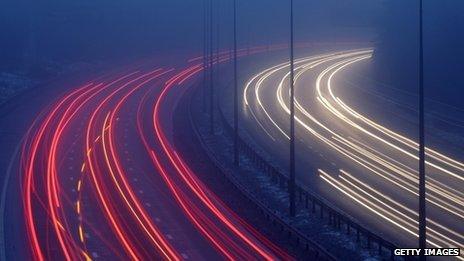What price our roads?
- Published

The Treasury is looking for new sources of finance for major roads
The search for capital for public infrastructure is trying to get creative.
This is one area where the Scottish government has been ahead of Whitehall, to find ways round Treasury borrowing constraints.
Now, it seems the Treasury is trying to get round its own constraints.
Unimpressed by the track record of the Private Finance Initiative and its variations, the search is now on for sovereign wealth funds and other major investors to take on Britain's infrastructure.
The Prime Minister's speech on the subject is unusually frank about how badly Britain has neglected infrastructure, particularly its transport.
So he's up for flogging off - sorry, leasing - the road network in England. This would only allow tolls on new-build, as is already the case with the toll road parallel with the M6 round Birmingham, while presumably government provides a stream of tax revenue as a sort of shadow tolling.
This may look a bit like the PFI deal that already gave us the M74 from Gretna into Lanarkshire, for instance.
But could it be there's a longer-term plan for a more fundamental change to the way roads are run and funded?
David Cameron is drawing a parallel with the way water boards were privatised, bringing private funding into the sector to bring the infrastructure up to date.
That certainly hasn't been an easy, comfortable or particularly popular process, though it's less controversial than it was, and its extension into Scotland has been resisted.
But the direction of travel for these privatised utilities has been to meter use and get the user to pay. Water meters, for instance, are becoming standard over the next few years.
And if that's the model for roads, it could be that the private sector could be best placed to introduce road pricing.
Rural areas
That has a strong logic from a green perspective - using satellite tracking technology to charge people most for use of congested roads at the busiest times.
By extension, those travelling on lightly-used roads, and at quieter times, can be expected to pay less per mile. So it has its attractions for those in rural areas.
The problems include the civil liberties implications, with a record kept of everywhere you drive. That said, the prosecution case in the Suzanne Pilley murder trial in Edinburgh this month, depending on CCTV records of where her murderer drove through Argyll, suggest those civil liberties have already sailed.
The bigger problem is the politics. The attempts of the Labour government at Westminster to introduce road pricing failed because they allowed the idea to be seen as an increased tax burden on motorists, rather than a replacement of the current fuel and road tax regime.
Foremost in creating that impression were Tory opposition politicians and their favourite newspapers.
The logic of road pricing hasn't gone away, however. Could it be that the private sector could get round such political objections, including those on government benches, and introduce road pricing?